安全科技英语
- 格式:pdf
- 大小:518.27 KB
- 文档页数:12
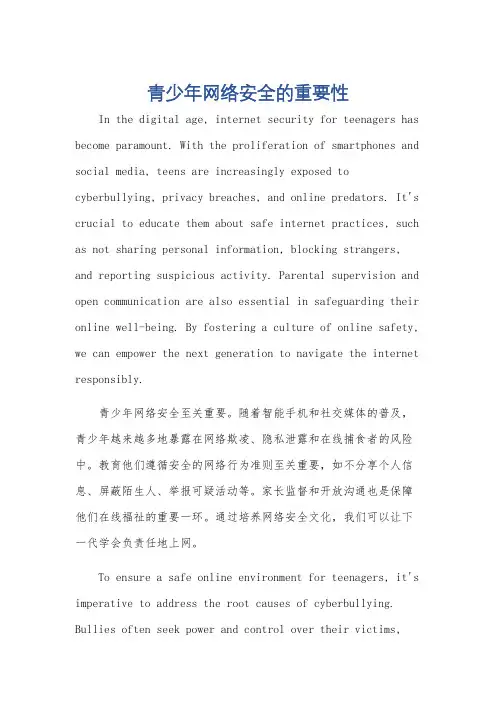
青少年网络安全的重要性In the digital age, internet security for teenagers has become paramount. With the proliferation of smartphones and social media, teens are increasingly exposed to cyberbullying, privacy breaches, and online predators. It's crucial to educate them about safe internet practices, such as not sharing personal information, blocking strangers, and reporting suspicious activity. Parental supervision and open communication are also essential in safeguarding their online well-being. By fostering a culture of online safety, we can empower the next generation to navigate the internet responsibly.青少年网络安全至关重要。
随着智能手机和社交媒体的普及,青少年越来越多地暴露在网络欺凌、隐私泄露和在线捕食者的风险中。
教育他们遵循安全的网络行为准则至关重要,如不分享个人信息、屏蔽陌生人、举报可疑活动等。
家长监督和开放沟通也是保障他们在线福祉的重要一环。
通过培养网络安全文化,我们可以让下一代学会负责任地上网。
To ensure a safe online environment for teenagers, it's imperative to address the root causes of cyberbullying. Bullies often seek power and control over their victims,and it's crucial to educate teens about the harmful effects of their actions. Schools and communities should promote positive digital citizenship by fostering a culture of respect and inclusivity. Moreover, it's essential to provide support and resources for victims of cyberbullying, such as counseling andreporting mechanisms.为确保青少年网络安全,解决网络欺凌的根源至关重要。
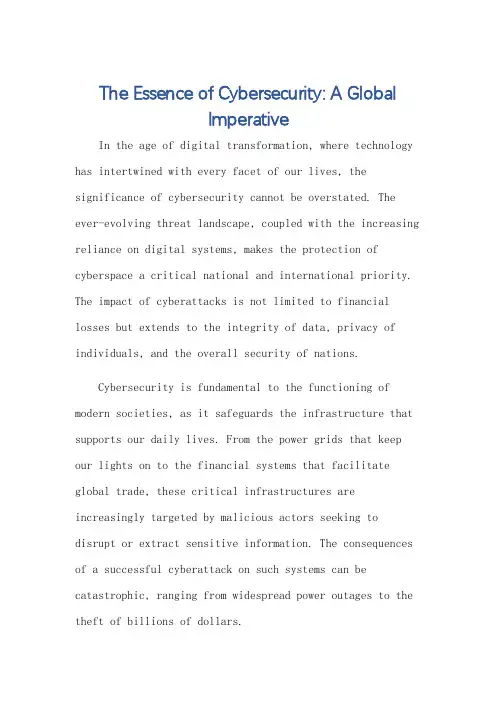
The Essence of Cybersecurity: A GlobalImperativeIn the age of digital transformation, where technology has intertwined with every facet of our lives, the significance of cybersecurity cannot be overstated. The ever-evolving threat landscape, coupled with the increasing reliance on digital systems, makes the protection of cyberspace a critical national and international priority. The impact of cyberattacks is not limited to financial losses but extends to the integrity of data, privacy of individuals, and the overall security of nations.Cybersecurity is fundamental to the functioning of modern societies, as it safeguards the infrastructure that supports our daily lives. From the power grids that keep our lights on to the financial systems that facilitate global trade, these critical infrastructures are increasingly targeted by malicious actors seeking todisrupt or extract sensitive information. The consequences of a successful cyberattack on such systems can be catastrophic, ranging from widespread power outages to the theft of billions of dollars.Moreover, the rise of the Internet of Things (IoT) and the proliferation of connected devices have exponentially increased the attack surface. Every smart device, from home thermostats to industrial robots, represents a potential vulnerability that needs to be secured. Failure to do so not only poses a threat to individual privacy but also to the integrity of the entire network.The personal impact of cyberattacks is also profound. With so much of our personal information stored digitally, a breach can lead to identity theft, financial loss, and emotional distress. Cybercriminals are constantly devising new ways to exploit vulnerabilities and steal sensitive data, making it crucial for individuals and organizations to stay vigilant and adopt robust security measures.Globally, cybersecurity has become a shared responsibility. International cooperation is essential in fighting against cybercrime, which often involves cross-border attacks and the utilization of complex networks. Multilateral agreements and the sharing of intelligence among nations are crucial in dismantling cybercrime networks and bringing perpetrators to justice.In conclusion, the importance of cybersecurity cannot be overstated. It is a crucial component of national security, economic stability, and personal well-being. As we continue to embrace digital technology, it is imperative that we also invest in the tools and strategies necessary to protect ourselves against the ever-evolving cyber threats. Only by doing so can we ensure a safe and secure cyberspace for future generations.**网络安全的重要性:全球性的迫切需求**在数字化转型的时代,科技已融入我们生活的每个角落,网络安全的重要性不容忽视。
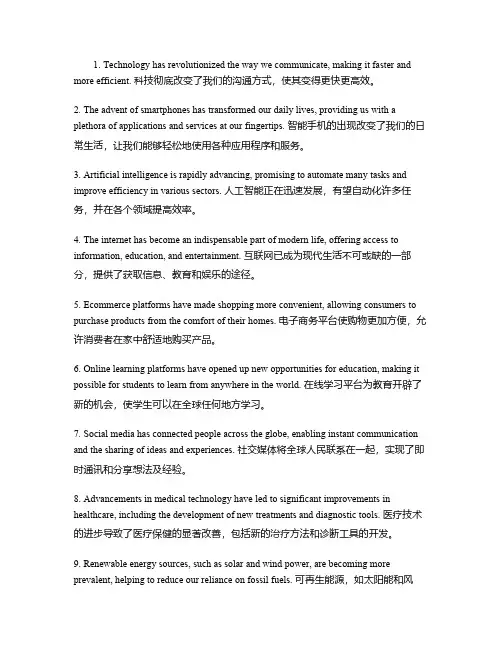
1.Technology has revolutionized the way we communicate,making it faster and more efficient.科技彻底改变了我们的沟通方式,使其变得更快更高效。
2.The advent of smartphones has transformed our daily lives,providing us with a plethora of applications and services at our fingertips.智能手机的出现改变了我们的日常生活,让我们能够轻松地使用各种应用程序和服务。
3.Artificial intelligence is rapidly advancing,promising to automate many tasks and improve efficiency in various sectors.人工智能正在迅速发展,有望自动化许多任务,并在各个领域提高效率。
4.The internet has become an indispensable part of modern life,offering access to information,education,and entertainment.互联网已成为现代生活不可或缺的一部分,提供了获取信息、教育和娱乐的途径。
5.Ecommerce platforms have made shopping more convenient,allowing consumers to purchase products from the comfort of their homes.电子商务平台使购物更加方便,允许消费者在家中舒适地购买产品。
6.Online learning platforms have opened up new opportunities for education,making it possible for students to learn from anywhere in the world.在线学习平台为教育开辟了新的机会,使学生可以在全球任何地方学习。
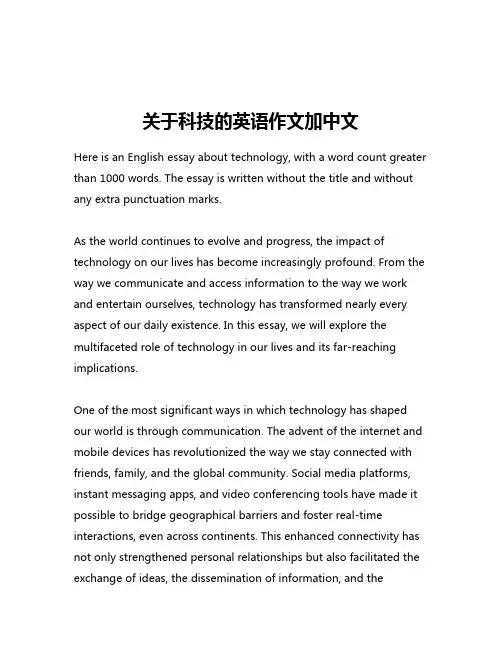
关于科技的英语作文加中文Here is an English essay about technology, with a word count greater than 1000 words. The essay is written without the title and without any extra punctuation marks.As the world continues to evolve and progress, the impact of technology on our lives has become increasingly profound. From the way we communicate and access information to the way we work and entertain ourselves, technology has transformed nearly every aspect of our daily existence. In this essay, we will explore the multifaceted role of technology in our lives and its far-reaching implications.One of the most significant ways in which technology has shaped our world is through communication. The advent of the internet and mobile devices has revolutionized the way we stay connected with friends, family, and the global community. Social media platforms, instant messaging apps, and video conferencing tools have made it possible to bridge geographical barriers and foster real-time interactions, even across continents. This enhanced connectivity has not only strengthened personal relationships but also facilitated the exchange of ideas, the dissemination of information, and thepromotion of cultural understanding on a global scale.Furthermore, technology has revolutionized the way we access and process information. With the vast resources available on the internet, we can now readily obtain knowledge on virtually any topic, from the latest scientific breakthroughs to the cultural traditions of distant lands. The proliferation of search engines, online databases, and digital libraries has empowered individuals to become self-directed learners, allowing them to expand their horizons and deepen their understanding of the world around them. This access to information has also fueled innovation and creativity, as people can easily research, collaborate, and build upon the ideas of others.In the realm of work and productivity, technology has transformed the way we approach our professional lives. The rise of automation, artificial intelligence, and cloud computing has streamlined numerous business processes, increasing efficiency and reducing the time and effort required to complete various tasks. This has allowed companies to focus on more strategic and value-added activities, ultimately enhancing their competitiveness and profitability. Furthermore, the advent of remote work and telecommuting has provided greater flexibility and work-life balance for employees, as they can now perform their duties from the comfort of their own homes or from any location with a stable internet connection.The impact of technology extends beyond the realms of communication, information, and work, as it has also transformed the way we entertain ourselves and engage in leisure activities. The proliferation of streaming platforms, online gaming, and augmented reality applications has revolutionized the entertainment industry, offering a vast array of content and experiences to cater to diverse preferences and interests. These technological advancements have not only expanded the options available to consumers but have also provided new avenues for creative expression and artistic exploration.However, it is important to acknowledge that the advancement of technology is not without its challenges and drawbacks. The reliance on digital devices and the constant connectivity can lead to issues such as screen addiction, social isolation, and the erosion of face-to-face interactions. Furthermore, the rapid pace of technological change can create a digital divide, where certain individuals or communities may lack access to these advancements, resulting in a widening of the socioeconomic gap.Moreover, the rise of data-driven technologies has raised concerns about privacy, data security, and the ethical use of personal information. As we increasingly entrust our personal data to digital platforms and services, the need for robust cybersecurity measures and transparent data management practices has become increasingly crucial. Navigating these ethical and privacy-relatedchallenges will be a crucial aspect of ensuring that technological progress benefits society as a whole, rather than privileging a select few.Despite these challenges, the overall impact of technology on our lives has been undeniably transformative and largely positive. By enhancing communication, expanding access to information, improving productivity, and enriching our leisure experiences, technology has undoubtedly played a pivotal role in shaping the modern world. As we continue to embrace and harness the power of technological advancements, it is crucial that we do so with a keen awareness of the potential pitfalls and a commitment to leveraging these tools in a responsible and equitable manner.科技在我们生活中扮演着日益重要的角色。

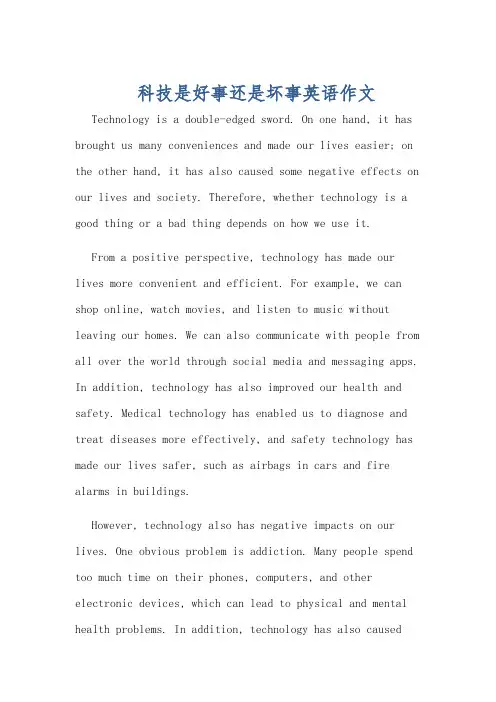
科技是好事还是坏事英语作文Technology is a double-edged sword. On one hand, it has brought us many conveniences and made our lives easier; on the other hand, it has also caused some negative effects on our lives and society. Therefore, whether technology is a good thing or a bad thing depends on how we use it.From a positive perspective, technology has made our lives more convenient and efficient. For example, we can shop online, watch movies, and listen to music without leaving our homes. We can also communicate with people from all over the world through social media and messaging apps. In addition, technology has also improved our health and safety. Medical technology has enabled us to diagnose and treat diseases more effectively, and safety technology has made our lives safer, such as airbags in cars and fire alarms in buildings.However, technology also has negative impacts on our lives. One obvious problem is addiction. Many people spend too much time on their phones, computers, and other electronic devices, which can lead to physical and mental health problems. In addition, technology has also causedsocial and cultural problems. For example, social media has made people more isolated and less connected in real life, and the internet has facilitated the spread of fake newsand hate speech.In conclusion, technology is neither good nor bad in itself; it depends on how we use it. We should make a conscious effort to use technology in a responsible and ethical way, and be aware of its potential negative effects on our lives and society.科技是一把双刃剑。
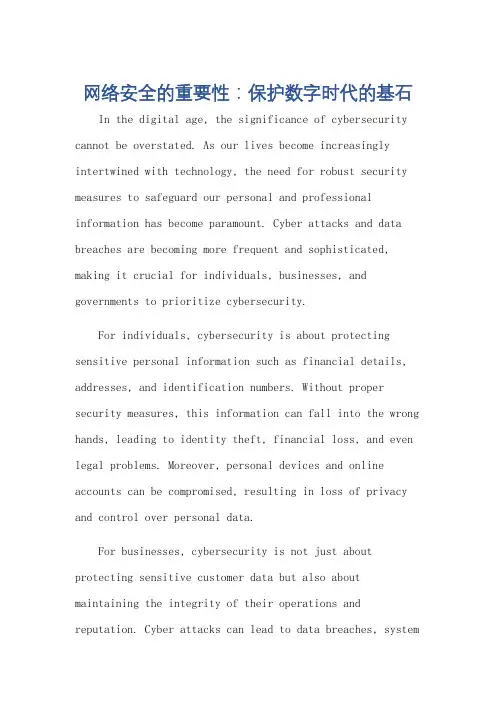
网络安全的重要性:保护数字时代的基石 In the digital age, the significance of cybersecurity cannot be overstated. As our lives become increasingly intertwined with technology, the need for robust security measures to safeguard our personal and professional information has become paramount. Cyber attacks and data breaches are becoming more frequent and sophisticated, making it crucial for individuals, businesses, and governments to prioritize cybersecurity.For individuals, cybersecurity is about protecting sensitive personal information such as financial details, addresses, and identification numbers. Without proper security measures, this information can fall into the wrong hands, leading to identity theft, financial loss, and even legal problems. Moreover, personal devices and online accounts can be compromised, resulting in loss of privacy and control over personal data.For businesses, cybersecurity is not just about protecting sensitive customer data but also about maintaining the integrity of their operations and reputation. Cyber attacks can lead to data breaches, systemdowntime, and financial losses. More significantly, they can damage the trust between a business and its customers, potentially leading to loss of market share and long-term damage to the brand.Governments also play a crucial role in cybersecurity. As the custodians of vast amounts of sensitive data, they must ensure that their systems are secure from external threats. Failure to do so can lead to national security breaches, loss of confidential information, and even political instability.To address these challenges, a multifaceted approach is needed. Individuals must be educated about basic cybersecurity practices, such as using strong passwords, updating software regularly, and being vigilant about sharing personal information online. Businesses need to invest in robust cybersecurity systems, train their employees, and conduct regular audits to identify and address vulnerabilities. Governments must collaborate with private sector partners to share intelligence, develop policies and regulations, and invest in research and development to stay ahead of evolving cyber threats.In conclusion, the importance of cybersecurity cannot be overstated. It is a shared responsibility that requires concerted efforts from individuals, businesses, and governments. By prioritizing cybersecurity and implementing effective measures, we can protect our digital lives and ensure the continued growth and prosperity of the digital economy.**网络安全的重要性:保护数字时代的基石**在数字化时代,网络安全的重要性不容忽视。
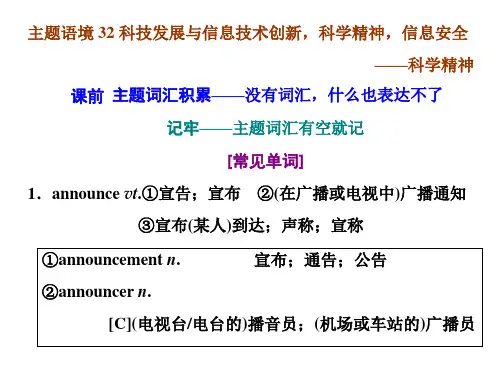
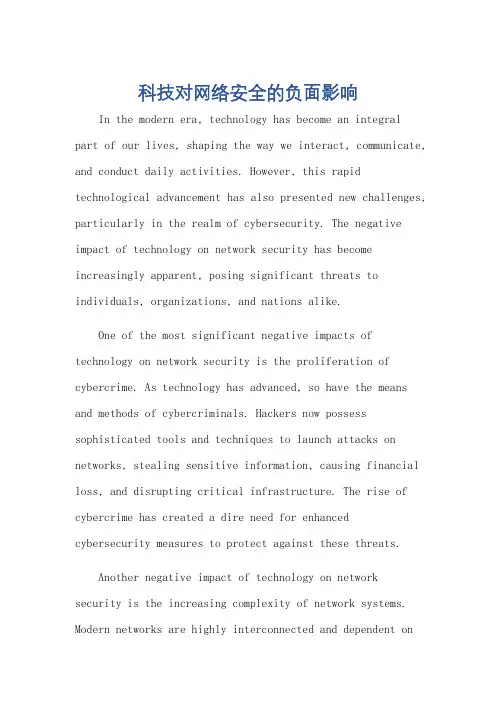
科技对网络安全的负面影响In the modern era, technology has become an integralpart of our lives, shaping the way we interact, communicate, and conduct daily activities. However, this rapid technological advancement has also presented new challenges, particularly in the realm of cybersecurity. The negative impact of technology on network security has become increasingly apparent, posing significant threats to individuals, organizations, and nations alike.One of the most significant negative impacts of technology on network security is the proliferation of cybercrime. As technology has advanced, so have the means and methods of cybercriminals. Hackers now possess sophisticated tools and techniques to launch attacks on networks, stealing sensitive information, causing financial loss, and disrupting critical infrastructure. The rise of cybercrime has created a dire need for enhancedcybersecurity measures to protect against these threats.Another negative impact of technology on networksecurity is the increasing complexity of network systems. Modern networks are highly interconnected and dependent ona range of technologies, including cloud computing, the Internet of Things (IoT), and artificial intelligence (AI). While these technologies offer significant benefits, they also introduce new vulnerabilities and challenges for network security. For instance, the widespread use of IoT devices has created numerous entry points for hackers, who can exploit these devices to gain access to sensitive information or launch attacks on larger networks.Moreover, the rapid pace of technological innovation often outpaces the ability of network security measures to adapt. As new technologies emerge, they often introduce new security risks that are not immediately recognized or addressed. This lag in security measures can leave networks vulnerable to attacks, as hackers quickly capitalize on these new vulnerabilities.Additionally, the globalization of technology has exacerbated the negative impact on network security. Networks are no longer confined to specific geographical regions; they are interconnected on a global scale. This interconnectedness has created opportunities for cybercriminals to launch attacks from anywhere in the world,making it more difficult to trace and prosecute them. The transnational nature of cybercrime has presented a significant challenge for law enforcement agencies and governments seeking to protect their networks and citizens from these threats.In conclusion, the negative impact of technology on network security is a pressing issue that requires urgent attention. The proliferation of cybercrime, the increasing complexity of network systems, the rapid pace of technological innovation, and the globalization of technology have all contributed to this challenge. To address these issues, it is crucial for individuals, organizations, and governments to invest in robust cybersecurity measures, stay vigilant against new threats, and collaborate internationally to combat cybercrime. By doing so, we can mitigate the negative impact of technology on network security and protect ourselves from the的危害of cybercrime.**科技对网络安全的负面影响**在现代社会,科技已成为我们生活中不可或缺的一部分,它塑造了我们的互动方式、交流方式以及日常活动的开展方式。
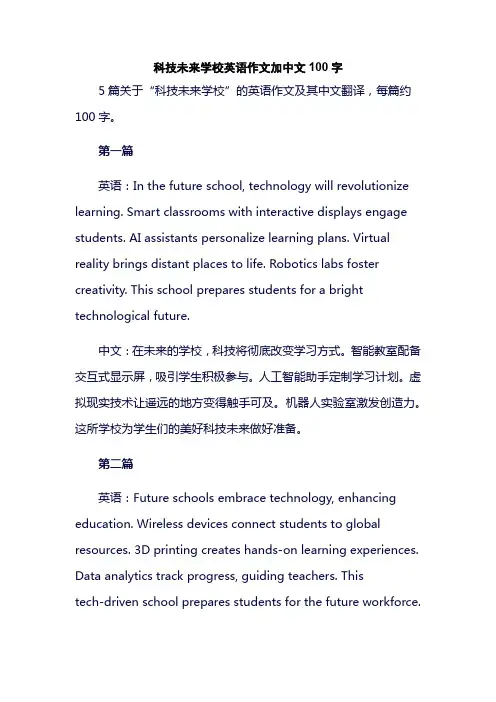
科技未来学校英语作文加中文100字5篇关于“科技未来学校”的英语作文及其中文翻译,每篇约100字。
第一篇英语:In the future school, technology will revolutionize learning. Smart classrooms with interactive displays engage students. AI assistants personalize learning plans. Virtual reality brings distant places to life. Robotics labs foster creativity. This school prepares students for a bright technological future.中文:在未来的学校,科技将彻底改变学习方式。
智能教室配备交互式显示屏,吸引学生积极参与。
人工智能助手定制学习计划。
虚拟现实技术让遥远的地方变得触手可及。
机器人实验室激发创造力。
这所学校为学生们的美好科技未来做好准备。
第二篇英语:Future schools embrace technology, enhancing education. Wireless devices connect students to global resources. 3D printing creates hands-on learning experiences. Data analytics track progress, guiding teachers. Thistech-driven school prepares students for the future workforce.中文:未来的学校拥抱科技,提升教育质量。
无线设备使学生能够连接到全球资源。
3D打印技术创造动手学习的体验。
数据分析跟踪学习进度,为老师提供指导。
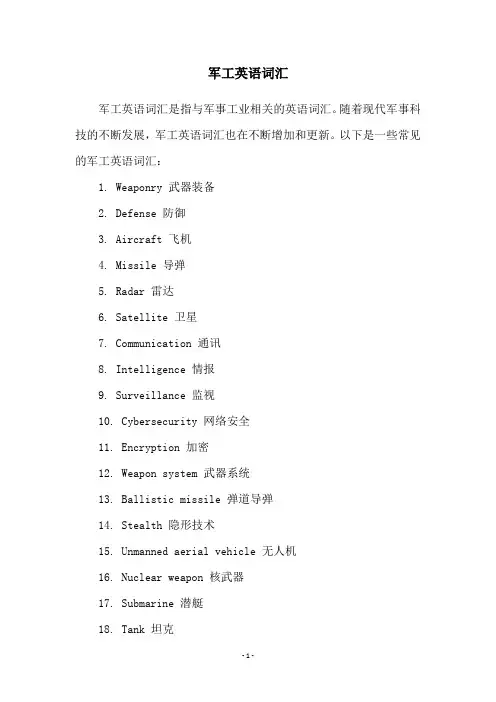
军工英语词汇
军工英语词汇是指与军事工业相关的英语词汇。
随着现代军事科技的不断发展,军工英语词汇也在不断增加和更新。
以下是一些常见的军工英语词汇:
1. Weaponry 武器装备
2. Defense 防御
3. Aircraft 飞机
4. Missile 导弹
5. Radar 雷达
6. Satellite 卫星
7. Communication 通讯
8. Intelligence 情报
9. Surveillance 监视
10. Cybersecurity 网络安全
11. Encryption 加密
12. Weapon system 武器系统
13. Ballistic missile 弹道导弹
14. Stealth 隐形技术
15. Unmanned aerial vehicle 无人机
16. Nuclear weapon 核武器
17. Submarine 潜艇
18. Tank 坦克
19. Electronic warfare 电子战
20. Countermeasure 对策
掌握军工英语词汇对从事军事科技领域的专业人才来说非常重要,也是学习英语的重要内容之一。
科技的利弊英语作文篇一:人工智能高科技影响利弊英语作文Artificial IntelligenceThe last decade has witnessed great change all over the world, especially about high-tech, artificial intelligence and so on. Artificial intelligence and technology has found its way into our daily life. Today, we give a topic about what and how they affect every aspect in life.过去十年见证了世界各地的巨大变化,特别是关于高科技,人工智能等。
人工智能和技术已经进入我们的日常生活。
今天,我们来谈一谈,他们如何影响生活的每一个方面。
Undoubtedly, advanced technology has make contribution to our daily life.In some special work environment, AI can help human to get the job done, like dangerous work, high labor work etc. AI not only reduce the burden of work, but also they tend to be more efficient, savemore time and labor costs. In additional, It is AI that bring our life unprecedented convenience, quick and comfort. Even separated by thousands of miles, we can still easily communicate throughhigh-tech.毫无疑问,先进的技术为我们的日常生活做出了贡献。
高二英语科技与互联网用语大全科技与互联网的快速发展已经成为当代社会的主要特征之一。
与此同时,英语作为全球通用语言,在科技与互联网领域中也扮演着重要角色。
本文主要介绍高二英语科技与互联网用语的大全,帮助读者更好地理解和应用这些词汇。
一、计算机与网络术语1. Computer(计算机)-一种可以根据指令进行计算的电子设备。
常用词汇包括keyboard(键盘)、monitor(显示器)、mouse(鼠标)等。
2. Internet(互联网)-一种将全球各地计算机网络连接起来的网络系统。
常用词汇有website(网站)、webpage(网页)、browser(浏览器)等。
3. Virus(病毒)-指在计算机系统中传播并对系统造成危害的恶意软件。
常见的病毒类型包括Trojan horse(木马病毒)和worm(蠕虫病毒)等。
4. Firewall(防火墙)-一种用于保护计算机网络安全的系统,可以监控和过滤网络传输的数据包。
二、电子邮件与通信用语1. Email(电子邮件)-电子邮件是一种通过互联网发送和接收邮件的通信方式。
邮件中常用的语言有subject(主题)、attachment(附件)等。
2. Chat(聊天)-通过即时通信软件进行在线交流的方式。
常用词汇包括message(消息)、conversation(对话)等。
3. Emoji(表情符号)-用于表达情感和附带信息的图形符号。
常见的表情符号有smiley face(笑脸)、heart(爱心)等。
4. Acronym(缩写词)-为了减少字符数和简化表达,常用词组被缩写为一串字母。
例如,“LOL”是“Laughing Out Loud”的缩写。
三、移动设备与应用程序用语1. Smartphone(智能手机)-一种功能强大的移动电话,带有多种应用程序和功能,例如短信、浏览器等。
2. App(应用程序)-一种可以在智能手机或平板电脑上运行的软件。
常见的应用程序有photo editing(照片编辑)、video streaming(视频流媒体)等。
科技是一把双刃剑英语作文Technology is a double-edged sword. On one hand, it has greatly improved our lives, making communication easier and more efficient than ever before. With the click of a button, we can connect with friends and family from all corners of the world, bridging geographical gaps and fostering relationships that were once limited by distance. However, this convenience also comes with a price - the erosion of face-to-face interactions and the potential for miscommunication in text-based conversations.科技是一把双刃剑。
在一方面,它极大地改善了我们的生活,使得沟通变得比以往任何时候都更简单和高效。
通过按下一个按钮,我们可以与世界各地的朋友和家人联系,弥合了地理上的差距,促进了那些曾经受限于距离的关系。
然而,这种便利也是有代价的——面对面交流的侵蚀以及基于文字的对话中可能存在的误解。
Moreover, the rapid advancement of technology has led to an increase in automation, which has the potential to displace human workers in many industries. While automation can increase efficiency and reduce human error, it also raises concerns about job securityand the impact on the economy. As industries become more reliant on machines and artificial intelligence, there is a fear that many traditional jobs will disappear, leaving a significant portion of the workforce unemployed and struggling to adapt to a rapidly changing job market.此外,技术的快速发展导致了自动化的增加,在许多行业可能取代人类工作。
科技是把双刃剑英语作文120字Technology is a double-edged sword. On one hand, it has greatly improved our lives and made many tasks more efficient.科技是一把双刃剑。
一方面,它极大地改善了我们的生活,并使许多任务更加高效。
With the invention of smartphones and the internet, we can now easily communicate with others regardless of distance. This has brought people closer together and has facilitated the sharing of information and ideas.随着智能手机和互联网的发明,我们现在可以轻松地和他人交流,不受距离的限制。
这使得人们更加紧密地联系在一起,并促进了信息和想法的分享。
However, technology also has its drawbacks. The increase in screen time and reliance on digital communication has led to a decrease in face-to-face interactions and interpersonal skills.然而,科技也有它的缺点。
屏幕时间的增加和对数字通信的依赖导致了面对面交流和人际交往能力的下降。
Furthermore, the rapid advancement of technology has also raised concerns about privacy and data security. With the collection of personal information and the prevalence of cyber attacks, many individuals and organizations are at risk of having their sensitive data compromised.此外,科技的迅猛发展也引起了对隐私和数据安全的担忧。
互联网英语词汇大全了解互联网与网络科技的专业术语互联网英语词汇大全——了解互联网与网络科技的专业术语随着互联网的快速发展,网络科技的不断进步,我们生活中充满了各种与互联网相关的词汇。
本文将为您提供一个互联网英语词汇大全,帮助您更好地了解互联网与网络科技的专业术语。
以下是一些常见的互联网英语词汇。
1. Internet(互联网)- The Internet is a global network that connects computers worldwide.It allows users to share information and communicate with others.- 互联网是一个全球网络,连接着全世界的电脑。
它允许用户分享信息并与他人进行交流。
2. Website(网站)- A website is a collection of web pages that are accessed through a specific URL. It contains information or services provided by an individual, organization, or company.- 网站是通过特定URL访问的一组网页。
它包含个人、组织或公司提供的信息或服务。
3. Web page(网页)- A web page is a single page of content that is part of a website. It contains text, images, links, and other multimedia elements.- 网页是网站中的一个页面,包含文本、图片、链接和其他多媒体元素。
4. Search engine(搜索引擎)- A search engine is a software program that helps users find information on the internet. It searches for relevant web pages based on keywords or phrases entered by the user.- 搜索引擎是一个帮助用户在互联网上查找信息的软件程序。
1安全科技英语SONG XiaoYanCollege of Applied Science and Technology
2011.8
English of Science & Technology for Safety Engineering Introduction
[课程的性质、目的及任务]•《安全工程科技英语》是安全工程应用型本科专业的学生在学习完基础英语之后开设的一般专业课程。
•其目的和基本任务是:使学生完成从基础英语到专业英语的过渡,巩固和提高学生的英语水平,扩大专业科技英语词汇量;培养学生阅读专业科技英文书刊、文章的能力,以拓宽专业知识面,了解专业最新发展动态;能够独立写好毕业设计或毕业论文的英文摘要。
[课程基本要求]•(一)学习并基本掌握本专业所涉及到的主要业务范围的基本专业词汇。
•(二)基本掌握科技英语的特点、构词法和译法,能够比较顺利地阅读和笔译专业英文书刊,基本具备查找专业英文资料的能力。
•(三)初步具备科技英文摘要或短文的写作能力。
[授课方法]•讲授、提问与讨论相结合
[学时安排]•32 credit hour
[评价方式]•考试+平时成绩•考核
•Part Ⅰ专业英语基础知识•Part Ⅱ科技英语翻译与技巧(包括写作)•Part Ⅲ科技英语翻译实例
[Contents主要内容]1.Mine Ventilation and Safety. 王德明. 矿大出版社,20082.实用科技英语翻译研究. 杨跃等. 西安交通大学出版社,2008
3.科技英语翻译技巧与实践. 谢小苑. 国防工业出版社,20084.煤炭科技术语. 煤炭科技术语工作委员会. 19945.采矿工程英语. 蒋国安等.矿大出版社,1998
[References参考文献]2
•科技英语词典•金山词霸2007专业版•http://dict.cnki.net/
[Useful tools for you有用工具]•Interesting•Practice makes perfect•Confidence[How to learn?]Is there any tips to do it?
Before beginning…•煤•煤矿•煤矿安全•通风•矿井通风•矿井空气•瓦斯•煤与瓦斯突出•瓦斯爆炸•粉尘(防治)•矿井火灾•安全第一
•coal•coal mine•coal mine safety•ventilation•mine ventilation•mine air •gas•coal and gas outburst•gas explosion•dust (control)•mine fires
国外安全成语•Safety is a commodity. •安全就是商品!•Safety at first •安全第一!•To be safe can not depend onwise behind.
•安全不能指望事后诸葛!•Tolerating danger is to cut one's own throat. •容忍危险等于作法自毙!•Second thoughtsare best for safety.
•为了安全须三思而后行!•A stumble may prevent a fall. •小跤可防大跌!(小惩大诫)
一、科技英语的特点(Features of EST)
逻辑性严密性简明性
Let’s go.科技英语是一种重要的英语语体,也称作科技文体。它是随着科学技术的发展而形成的一种独立的文体形式。科技英语既涵盖自然科学领域的各种知识和技术,也包括社会科学的各个领域,如:用英语撰写的有关自然科学和社会科学的学术著作、论文、实验报告、专利产品的说明书等。
(-)科技英语语言特点•科技英语的语言基本属于书面语言,不适于朗读和吟咏。因为它的词汇意义比较专一,稳定,表达方式也较简单,语汇不具感情内容,很少使用文学英语中常用的那种比喻、排比、夸张等修辞手段,更不像文学英语那样讲求词形悦目,语音悦耳。3
(二)科技英语词汇特点•1、国际性强。•2、科技英语中,很少用口语体词汇,多用书面(或正式体)词汇。•3、利用前缀后缀构成的派生词多。•4、专业、科技词汇较多。electrochemicalmacroeconomicsmicroeconomicscoal(rock)& gas outburstraisen. 上升, 高地, 提出vt.升起, 唤起, 提高, 使出现, 解除, 饲养, 筹集, 使复活【数】使自乘;【纺】使起绒;【航海】(船驶近)使(陆地等)出现煤矿:上山(三)语法特点•1、大量使用名词和名词词组•2、大量使用被动语态•3、大量使用非谓语动词短语(如动名词)•4、长句结构较多•5、句子成分分隔,句子成分及关联词语的省略现象较多
•eg: Some of the most common methods of inputting informationare to use magnetic tape, disks, and terminals.
•输入信息的一些最普通的方法是使用磁带、磁盘和终端。
•1. VENTILATION•1-1 The Main Functions of Ventilation[1]
•Ventilation is one of the most important aspects of longwallmining. The main functions of ventilation in longwallmining is:
•A. Supply of fresh airat tolerable heat and humidity levels[2] for the mine workers to breathe.
•B. Removal of noxious(有害的)gassesfrom the
mine atmosphere that are produced from the coal seam and mining equipment.
二、煤矿科技英语(Science & Technology English of Coal Mine)
[1] ventilation:通风[2] tolerable heat and humidity levels:可容忍的热和湿度标准
1-1 通风的主要作用通风是长壁采煤法中的最重要的内容之一。长壁采煤通风的主要作用有:A. 为矿井工人提供呼吸用的新鲜空气,并处于适宜的热湿环境中。B.从矿井环境中排出煤层中存在的或由于采煤设备产生的各种有害气体。
•1-2 Ventilation Systems•The type of ventilation system used in a longwallmineis dependant uponthe conditions found at each mine. The most influential factor[3] in the
choice ofventilation system is the amount of gas that is present in the mine atmosphere. If the mine is considerably gassy, the gas in the mine has to be removedfrom the working panel as quickly and safely as possible.
•The most common types of ventilation systems found in U.K are:
[3] influential factor:有影响的因素,决定性因素
•1-2 通风系统•长壁采煤法矿井通风系统的类型取决于各矿井的基础条件。选择通风系统时最主要的影响因素是矿井空气中含有的瓦斯总量,如果矿井中含有大量的瓦斯,则必须尽快且安全的将瓦斯从采区中排放出去。•英国矿井中最常见的通风系统类型为“U”型系统、“Z”型系统、“E”型系统等。4
1. VENTILATION•A.“U”System•This is the simplest form, the mining district[4] is
developedusing two raises[5], both being
maintainedin front of the face for retreating mining.
•Ventilation of the method can employ two, or even three parallel intake and return gates[6]. The intake and return gates are drawn off[7] behind the face.
The system is calledreverse systemasthe intake air travels in the reverse direction tothe return air.
[4] mining district:采区[5] raises:上山[6] intake and return gates:区段进风和回风平巷[7] draw off:报废,拆除
这是最简单的形式,挖掘区系使用两个加薪,都被维持在前面的脸部撤退的挖掘(--有道在线翻译)
A.“U”型通风系统•这是一种最简单的通风方式,采区以两条上山进行开拓,且两条上山均需要在回采工作面的前方得到维护(或:且两条上山均被维护在回采工作面的前方)。
•这种通风方式设有两条或三条平行的区段进风和回风平巷。工作面后方的进回风平巷逐步冒落报废。由于进风流方向与回风流方向相反,这种系统称为后退式通风系统。
•The raises, intake and return gates are maintainedbehind the face in gob area[8] for advancing mining
while ventilation flow and pressure distribution across the gob area increasing the air leakage[9].
•The system has a smaller air leakage for retreating face, but it has a longer and changing ventilation lines, and a larger air leakage for advancing face. The system is suitable forcoal seams that have very low gas emission rates.